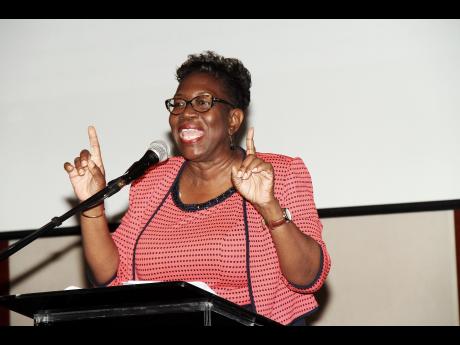Anti-gang flaw - DPP says lack of search warrant provision in law hindering investigations
DPP: Anti-gang law too soft on silent partners in crime
The nation's top prosecutor has raised concerns that there is no "expressed provision" in the anti-gang legislation that allows law enforcement authorities to obtain a search warrant for accountants and other "silent partners" who are helping gangsters finance their criminal lifestyle.
The Criminal Justice (Suppression of Criminal Organisations) Act, also known as the anti-gang legislation, was enacted four years ago to help crush criminal gangs, which, according to the police, are responsible for more than 60 per cent of all murders in Jamaica. However, Paula Llewellyn, director of public prosecutions (DPP), in an interview with The Gleaner yesterday, said that unlike the Dangerous Drug Act, or the Firearms Act, which allows investigators to get a warrant to enter and search premises, the anti-gang legislation makes no such provision.
"So what they [investigators] have to do now, is use the regular common law, where, for example, they are approaching a house and gangsters open fire at them. That's a felony, and that enables the police to knock down the doors and enter that house and get evidence," Llewellyn explained.
She, however, questioned what would happen in cases where investigators have credible information that the gang members, or its leader, have a separate location in an upscale community from where they direct their criminal activities. "What would empower them [investigators] to go in there, search, and seize?" she questioned. "Suppose one of their silent partners is an accountant - he does the financials for the gang and he has a lovely office somewhere in New Kingston - how would the police go in there and get it?" she continued.
Llewelyn acknowledged that investigators could go through a "convoluted" process under the Proceeds of Crime Act or other related legislation. But she argued that allowing them to get a search warrant would be far easier. "It [the legislation] restricts them in gathering evidence to catch all the players," she insisted.
Llewellyn, during an address on Tuesday at the annual general meeting and conference of the Association of Caribbean Commissioners of Police, being held in Montego Bay, said that this was one of the challenges to prosecute cases under the anti-gang legislation. Another issue, she said, was that police investigators are not "sufficiently intimate" with the four-year old legislation. "This leads to matters being poorly investigated," she reasoned.
Further, Llewellyn said that there is reluctance within the Jamaica Constabulary Force to take a "task force approach" to investigations involving criminal gangs. "Instead, it appears as if individuals are seeking to take the credit," she said. "As police officers, you cannot work in silos, but must cooperate and share with each other as the criminals are aware of this and are acting in joint enterprise," Llewellyn said.

